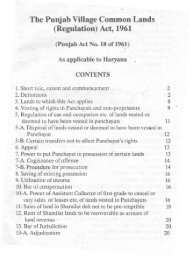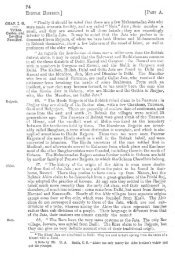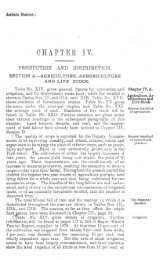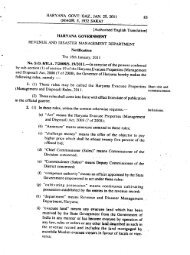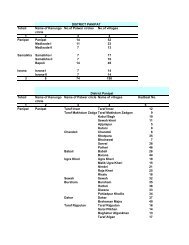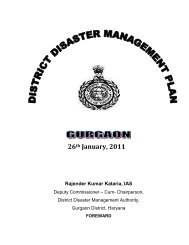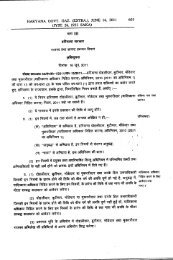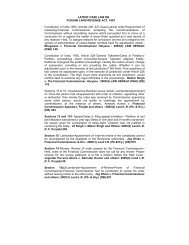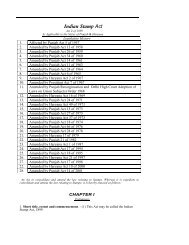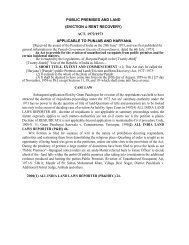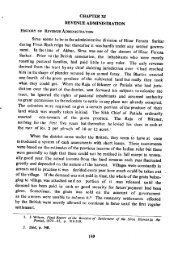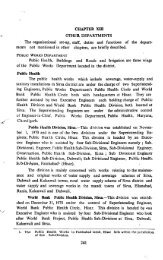chapter - ix - revenue and disaster management department, haryana
chapter - ix - revenue and disaster management department, haryana
chapter - ix - revenue and disaster management department, haryana
You also want an ePaper? Increase the reach of your titles
YUMPU automatically turns print PDFs into web optimized ePapers that Google loves.
shops dealing in ready-made garments. There are 25 shops of ready-madegarments in the district. The incrp3.singuse of bicycles, auto-cycles, cyclerickshaws,scooters <strong>and</strong> motor-cars has been responsible for attracting peopleto take to the business of cycle <strong>and</strong> auto-repairing. Bicycle repairers arefound in every nook <strong>and</strong> corner of the district. Businessisusually brisk forthem all the year round. Automobile repairers are confinedalmost entirelyto urban areas. There are 60suchshops in the district.The time oldjulahas tweavers), mochis (cobblers), potters <strong>and</strong> sweepersare spread throughout the district <strong>and</strong> serve both the rural <strong>and</strong> urban com.munity. Most ofthem in rural areas help familiesintheir agricultural acti·vities <strong>and</strong> perform their customary professional services on the occasion ofmarriages <strong>and</strong> other ceremonies. The mochi (cobbler) with equipment hang.ing bythe shoulder in abox, may usually beseenhawking for his servicesInthe streets. Cobblers usually attend tothe repair mending <strong>and</strong> recondition·ingof shoes. Others who make new shoeshave their own shops. Thereisa shoe-making factory ofHaryana Footwear Corporation making all typesofshoes, s<strong>and</strong>als <strong>and</strong> c1zappalsfor women ~.ndmen. The potters make ordinaryvesselsmostlyfor the useof villagers. The earthen pitchers <strong>and</strong> surahis,because oftheir property to cool water, are sold inlargenumber during thesumliler season both inthe urban <strong>and</strong> rural areas. The sweepersengagedincleaning hous-;:sinurban areas, geta fewrupees per month inaddition to oneor two chapatis daily or weekly<strong>and</strong> occasionally small giftsin cash or kind,on festivals <strong>and</strong> ceremonial occasions. In recent years, owing to better employmentfacilities <strong>and</strong> privileges, some sweepers have been shifting over toservices in Government offices<strong>and</strong> private organizations.Th.ltheras (utensil makers) <strong>and</strong> lohars (blacksmiths) of Bhiwani <strong>and</strong>Loharu are reputed for their brass utensils <strong>and</strong> iron containers. The tokni(brasscouldron) of Bhiwani isa popular utensil of the area.The h<strong>and</strong>-cart p~dlars <strong>and</strong> hawkers go about the towns <strong>and</strong> villageshawking their goods. The goods whichthey sell include among other articlesof daily use, vegetables, fruit, eatables, general merch<strong>and</strong>ize, crockery, cloth<strong>and</strong> toys.A typicalclassof Hindu priests (p<strong>and</strong>as <strong>and</strong> purohits) isfound scatteredall over the district. They perform the customary religious practices, forthe families to whIch they are traditionally attached <strong>and</strong> make living onthis. DExcept )n very)mall :villages, a tea-stall .ofsome kind has made its



